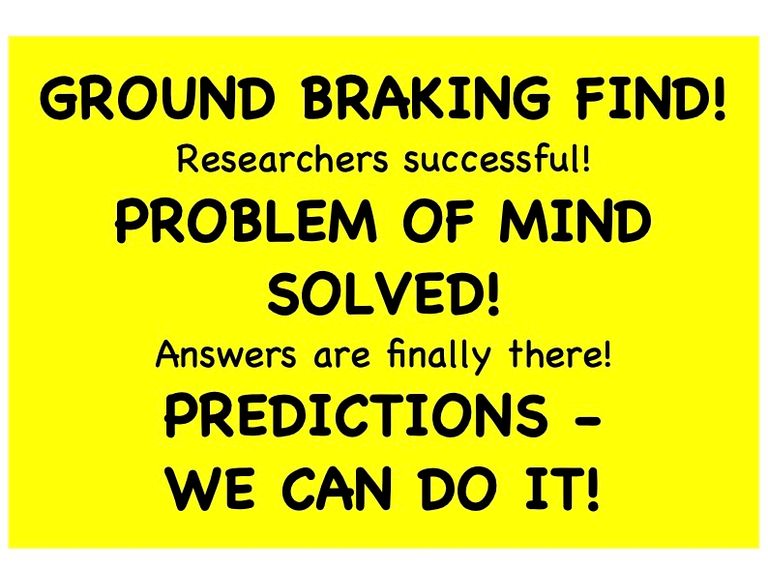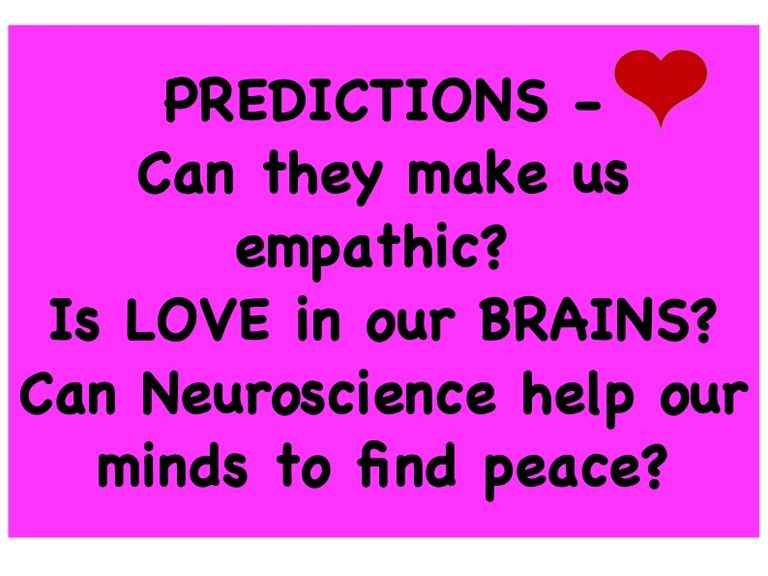
By looking at brain activity while making a decision, the researchers could predict what choice people would make before they themselves were even aware of having made a decision.
Aha.
Who, in this context, is the "brain having an activity" and "they themselves"?
What if you were to repeat the same question with the same human in the same setting over and over again?
Is the brain the "I" and "myself" the "me"?
Here, all ready, I've got several terms, hence, identifications. Who is supposed to be the real me? The brain? The wearer of the brain "himself"? The thinker who thinks of two different me? Who? And if you so split yourself into different identities, which one of those has the bigger say? Who is more right?
I would add the relevance of this statement
"Your brain makes up its mind up to ten seconds before you realise it"
to something like the similarly silly question, "which came first, the chicken or the egg?"
Such things sound important, but they are not.
They sound "deep" and "significant", they just seem "impressive", but they are not.
It sounds as if there is a difference between "you" and "your brain". Funny.
It is questions like these, which no one can really answer, that comically stir the emotions and cause, if you are dead serious about them, whole families up to nations to fall out with each other.
I salute to the above sentence and laugh at its fake awesomeness!
Arrested ideas
One can list an almost endless series of stupid (fixated) questions, such as whether "humanity is good or bad in and of itself", "why God does not prevent war", whether "women are more sensitive than men", "whether patients should be told that they will die or not", "what is better, capitalism or socialism", "if we live in a simulated world", "how the universe came into being".
Whether "humans have free will or not"
fits very nicely into the endless stream of irrelevant questions, especially and when such questions are meant seriously.

Apart from all these seemingly "profound and fascinating" questions and their answers, it happens every day that one eats, drinks, sleeps, talks, drives a car, tanks, runs, smokes, lies, laughs, gets wet, hot, cries, is born and dies.
It is irrelevant to wonder if my brain "knows before I do" what I want.
HaHa! It will not make it different in what I say, not say, do or not do. True, I indeed oftentimes, if not most of the times, really am not certain what I want.
I probably shall consult my brain, because it knows better than me. HaHa!!
But let's get serious for just a tiny moment. Shall we?
I know for sure when I feel like shit or feel friendly. Don't you?
End of seriousness.
I need not to know about "others", if "their brains" might say "Do" or "Don't" before their mouths.
I need not worry not having a free mind.
I don't even know what "mind" is.
It's not (my) brain. It's not (my) soul, it's not body, it's not a water melon, it's not rainbow, it's not football, it's neither matter nor non matter. My mind seems also not to be "mine" entirely, when I consider myself an organism who, like my brain, is embedded into its environment. Organisms function as a whole, in fluid connection to other "wholes".
But to state that "I am not free, for my mind is not entirely mine", is a false statement.
There is no "cause" as in "because" my mind is not mine, I am unfree". Winter does not cause spring. Both happen.
"Science and Scientists" cannot catch minds with their minds.
They certainly want to ex-plain mind with measures, by ex-cluding the parts of which they have chosen to concentrate on.
The prefix "ex" points to itself, for it does "ex"plain.
Plain, without its prefix is what I do not need to exclude, divide and compare, need not to measure. On the other hand, measured, so-called facts always give room for contradiction, debate and further questioning, otherwise they would not be facts.
That's the nature of facts, they are unreliable.
Facts are true by convention. In order to measure a fact, you have to have a cut off. To determine where to set a point. So you have a pre-point.
Like I toyed with in this text: the doctor who allows himself a certain percentage of patients to die under his shift, realises that this ten per cent he has set as a quantum does not free him from caring for the individual human being.
What it does, is to give him the odd question of whether, below this percentage mark, he cares not and, above the percentage mark, starts to care. While, also, you could say that this very question can liberate him from worries over life and death questions. This man may realize that it matters not for his daily practice of skillful spontaneity.
Such questions reveal the paradox of (pre)determinations.
If the blood pressure is too high, it is for the mark, the number. But how do we arrive at the fixed value? Simple. By determining it. Instead of 120 to 80, why not 130 to 70? It is convention. Nothing more.
The setup alone, to be shown pictures (or other sensory inputs) on the basis of which one creates a decision, is absurd.
The controlled setting, where people have electrodes put on their heads and create "as if" situations, it pretends to be a reality. As if the laboratory experiment could make valid statements about the non-laboratory experience. As if this setting could already be equated with (all) other events.
We are free to decide because decision happens. We simply decide without the faintest understanding of how we do it. In fact, it is neither voluntary nor involuntary.
Facts are slippery.
What seems solid in contrast to these facts is thought.
In thought, you can stick to ideas. My thoughts make facts solid, not the facts are solid in and of themselves.
Because the idea is so much more comprehensible than the reality, the symbol so much more stable than the fact, we learn to identify with ourselves with our idea of ourselves. Hence, the subjective feeling of a "self" which "has" a mind, of an inwardly isolated subject to which experiences involuntarily happen.
In order to escape the slippery nature of facts you set them straight.
You give them cut offs, ends and means. You "idea" facts. Take this not as a noun but as a verb.
We feel that our actions are voluntary when they follow a decision and involuntary when they happen without decision. But if decision itself were voluntary, every decision would have to be preceded by a decision to decide- an infinite regression.
Alan Watts, from whom I copied the quotes in this text added that "this regression fortunately does not occur." (Book source: The way of Zen.)
Oddly enough, if we had to decide to decide, we would not be free to decide.
Therefore, what we are presented (and also present!) with in terms of "pressing and urgent questions" is not really open-ended (voluntary), because the very sentence that one is free to get all the information (facts) on the question raised is a trick to be supposed to find an answer to a question that is actually unanswerable.
Now, will you get mad? Will you laugh? Both is possible, right? Depends, right?
The question itself must therefore be disqualified and described as "irrelevant".
In short, it is a stupid question. "To be or not to be" is just as stupid as "to treat or not to treat", "to grant or not to grant", because these questions give themselves the appearance of importance while they are not. So, too, "voluntarily or involuntarily" is nothing that can be fixed.
If I suddenly sent my niece a message on her mobile phone out of nowhere:
"Typical you! You've screwed up!" without anything having happened at all. Simply because I made it up. What would happen?
With such a message, my niece would think that something terrible had happened and she would immediately associate it with a recent situation in her life. I would simply have set an agenda, out of the blue, like an April Fool's joke.
In a somewhat similar fashion, I see stupid questions being asked.
have you heard of Rupert Sheldrake? He's probably my fave scientist atm. He says that our 'memories' are not stored in the brain, they are outside of our bodies in the ether. Therefore our brains must be like a kind of bio-computer (maybe the processor bit) and it just processes our thoughts and files them out in the ether. This would also fit in with the 'collective consciousness' idea AND the DNA being antenna which connect to the 'collective consciousness' via bio-wifi?
I'm very indecisive myself and tend to procrastinate EXCEPT when I am in dangerous situations when something kicks in and makes decisions for me, no brain needed.
Does it say what or who they did these experiments on? I'd be interested to know coz I bet it wasn't women hahahahaha
Yes, I have listened to many lectures by Sheldrake and read a book by him. I have tried to understand his morphic resonance theory, but I have to say that I could not explain it and so I hold that I did not fully understand it. As far as I remember, he does not mean storage of memories in the proverbial sense, the computer analogy does not quite fit in my view, I just remember that instead of memories he speaks of "habits" which, unlike laws, are not fixed but change.
I once had written contact with him personally because we took up his idea of telephone telepathy and wanted to develop a mobile phone app from it. He responded very kindly to our questions. Unfortunately, nothing came of it because we couldn't find a programmer who could have technically implemented our concept.
You can see the source of the scientific experiment at the top under my first quote. It is a small article, nothing more. I think there were fourteen test persons. I would say that the premise can already be described as nonsensical and in my eyes it is not real science but pseudoscience.
To make a distinction between the thinker (mind) and the brain is, if I put it facetiously, a schizophrenic affair in which the schizophrenic is not aware that he has split his personality.
It's like wanting to wash blood from the body with blood. LOL